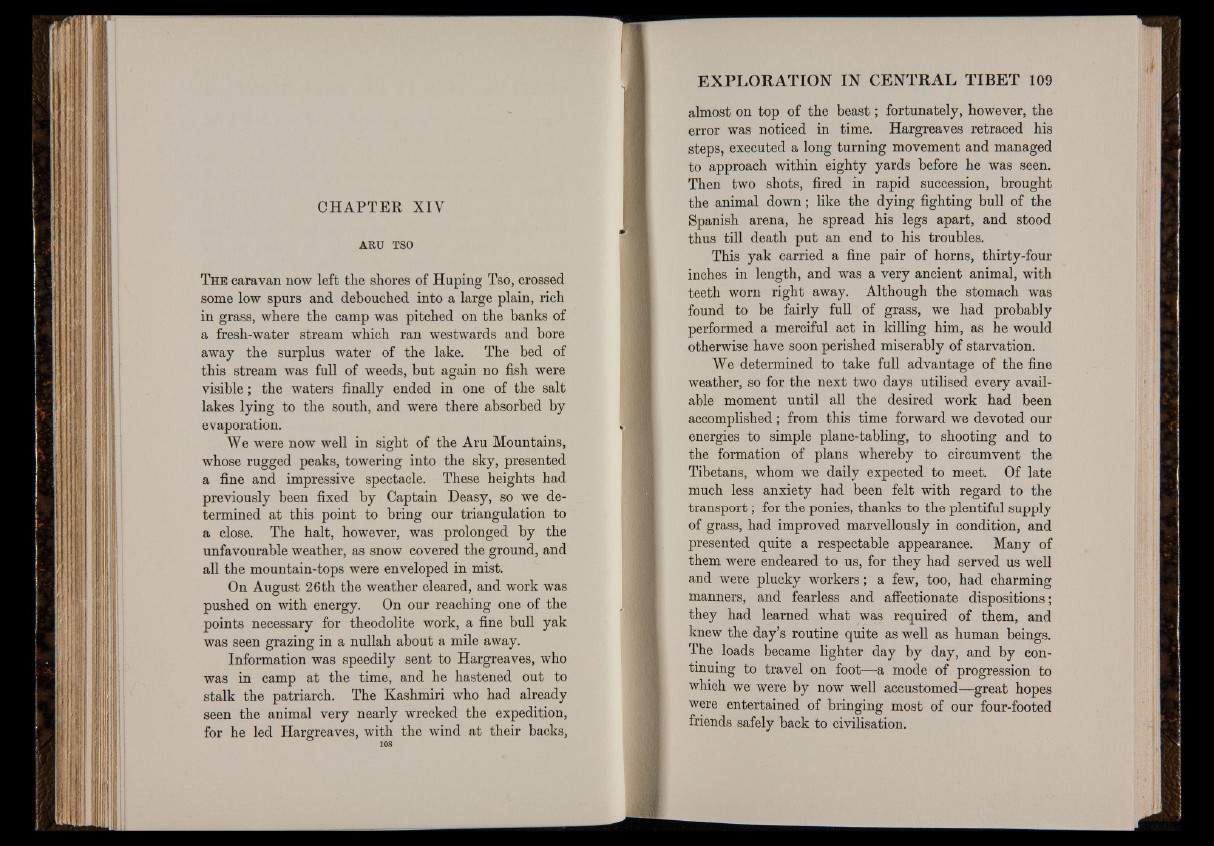
CHAPTER XIV
ARU TSO
The caravan now left the shores of Huping Tso, crossed
some low spurs and debouched into a large plain, rich
in grass, where the camp was pitched on the banks of
a fresh-water stream which ran westwards and bore
away the surplus water of the lake. The bed of
this stream was full of weeds, but again no fish were
visible; the waters finally ended in one of the salt
lakes lying to the south, and were there absorbed by
evaporation.
We were now well in sight of the Aru Mountains,
whose rugged peaks, towering into the sky, presented
a fine and impressive spectacle. These heights had
previously been fixed by Captain Deasy, so we determined
at this point to bring our triangulation to
a close. The halt, however, was prolonged by the
unfavourable weather, as snow covered the ground, and
all the mountain-tops were enveloped in mist.
On August 26th the weather cleared, and work was
pushed on with energy. On our reaching one of the
points necessary for theodolite work, a fine bull yak
was seen grazing in a nullah about a mile away.
Information was speedily sent to Hargreaves, who
was in camp at the time, and he hastened out to
stalk the patriarch. The Kashmiri who had already
seen the animal very nearly wrecked the expedition,
for he led Hargreaves, with the wind at their backs,
108
almost on top of the beast; fortunately, however, the
error was noticed in time. Hargreaves retraced his
steps, executed a long turning movement and managed
to approach within eighty yards before he was seen.
Then two shots, fired in rapid succession, brought
the animal down; like the dying fighting bull of the
Spanish arena, he spread his legs apart, and stood
thus till death put an end to his troubles.
This yak carried a fine pair of horns, thirty-four
inches in length, and was a very ancient animal, with
teeth worn right away. Although the stomach was
found to be fairly full of grass, we had probably
performed a merciful act in killing him, as he would
otherwise have soon perished miserably of starvation.
We determined to take full advantage of the fine
weather, so for the next two days utilised every available
moment until all the desired work had been
accomplished; from this time forward we devoted our
energies to simple plane-tabling, to shooting and to
the formation of plans whereby to circumvent the
Tibetans, whom we daily expected to meet. Of late
much less anxiety had been felt with regard to the
transport; for the ponies, thanks to the plentiful supply
of grass, had improved marvellously in condition, and
presented quite a respectable appearance. Many of
them were endeared to us, for they had served us well
and were plucky workers; a few, too, had charming
manners, and fearless and affectionate dispositions;
they had learned what was required of them, and
knew the day’s routine quite as well as human beings.
The loads became lighter day by day, and by continuing
to travel on foot—a mode of progression to
which we were by now well accustomed—great hopes
were entertained of bringing most of our four-footed
friends safely back to civilisation.